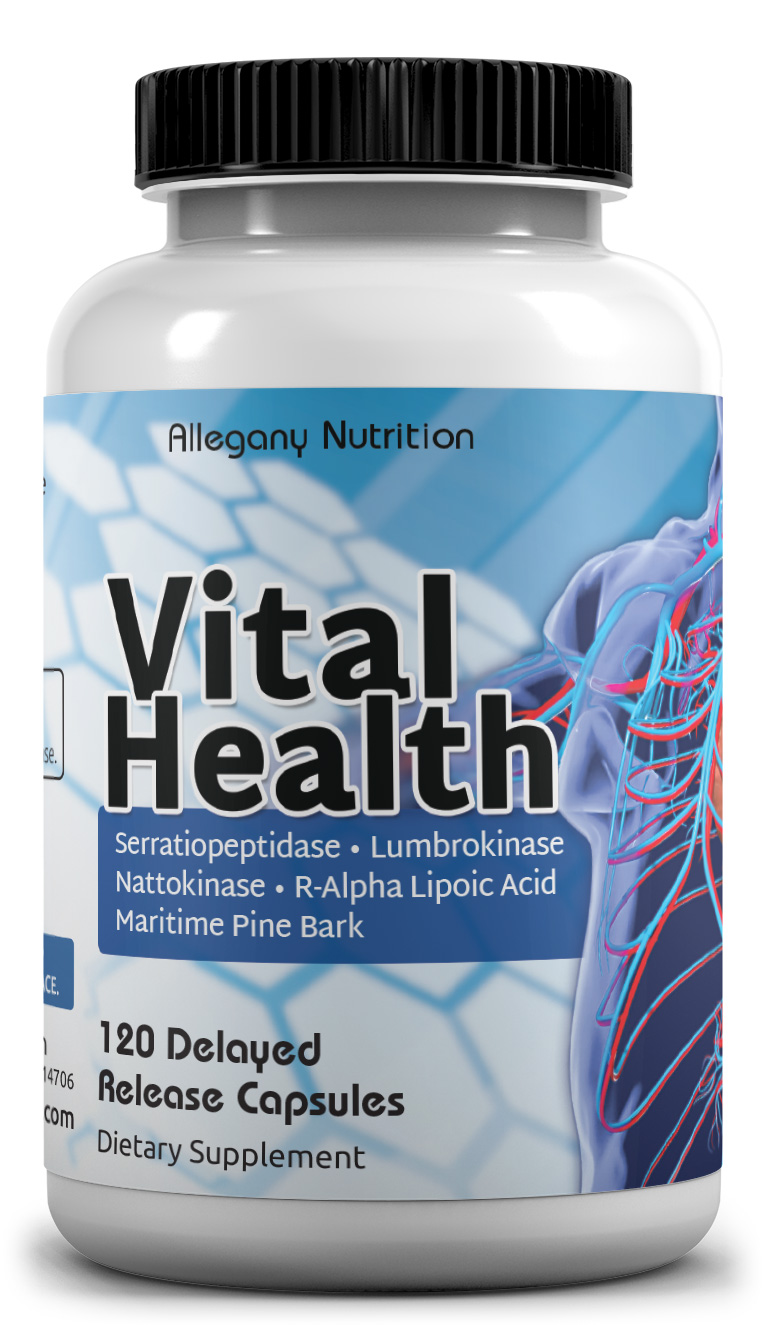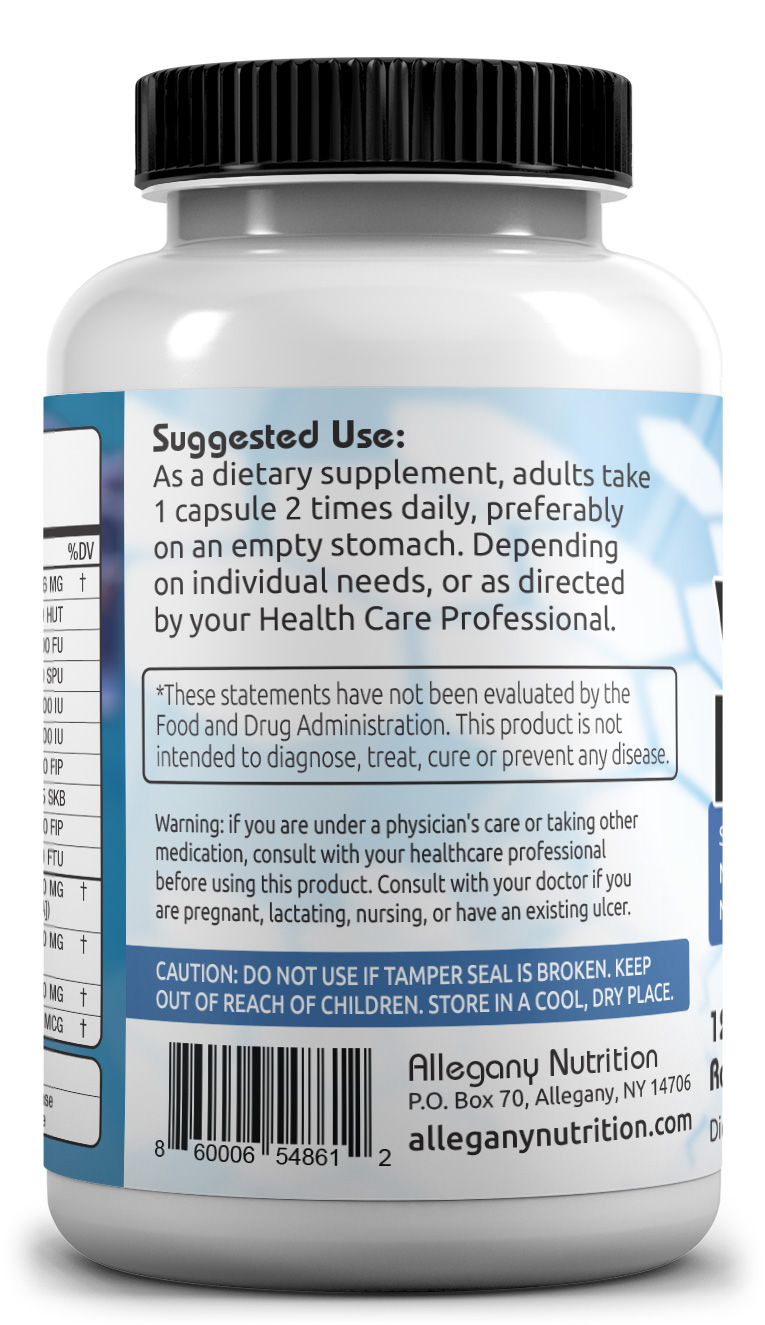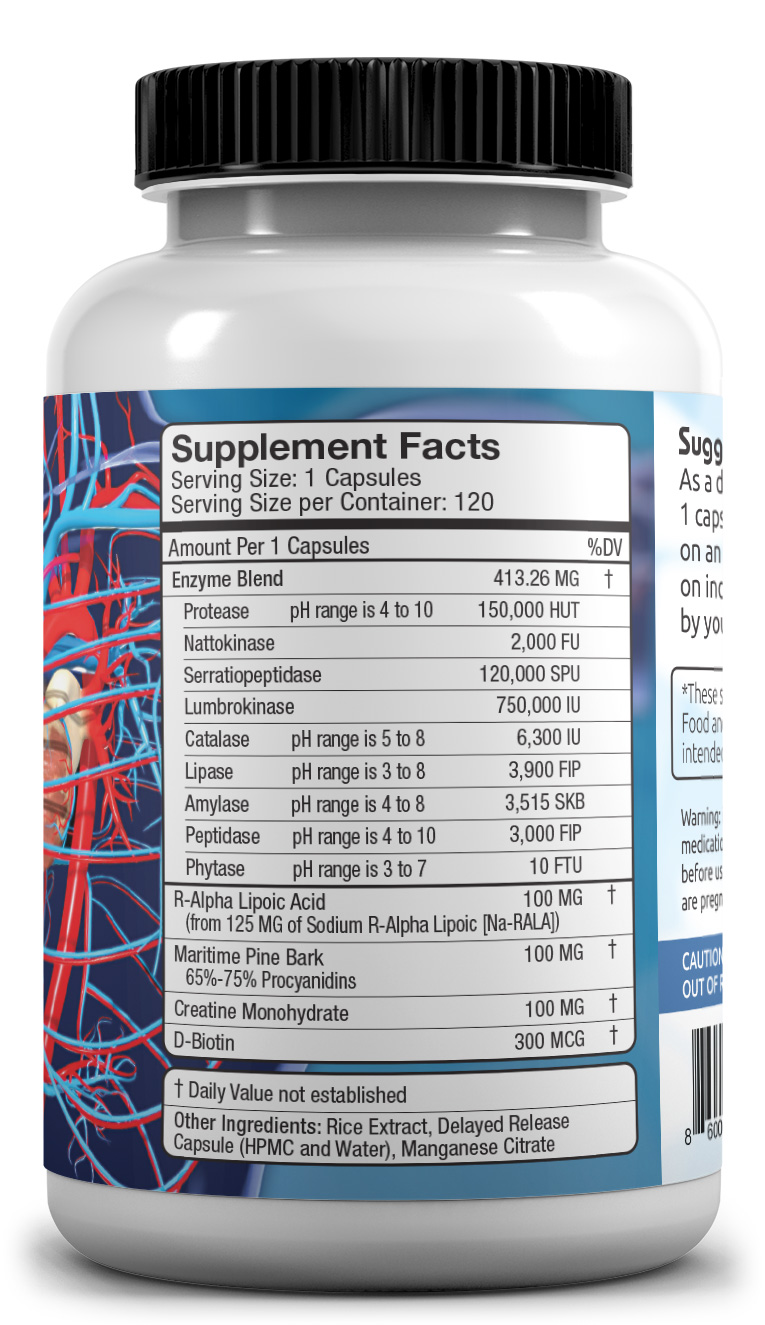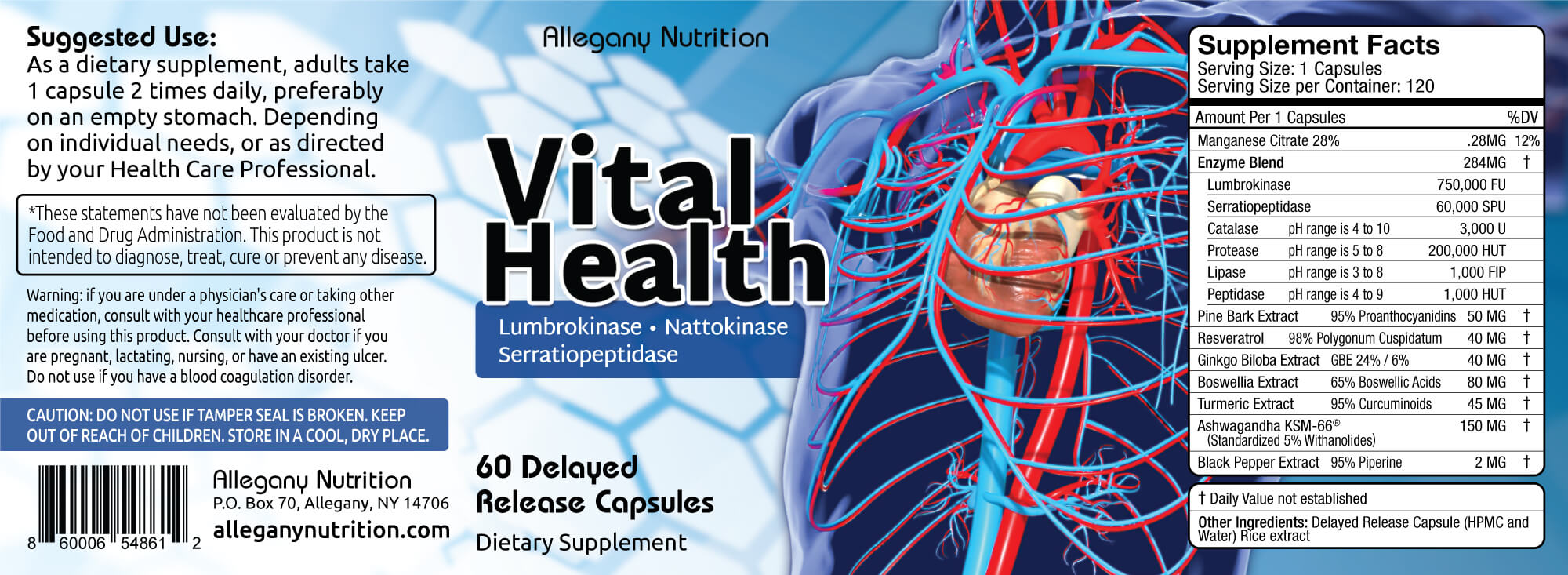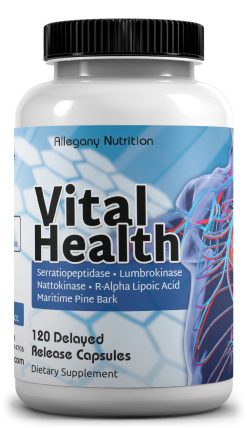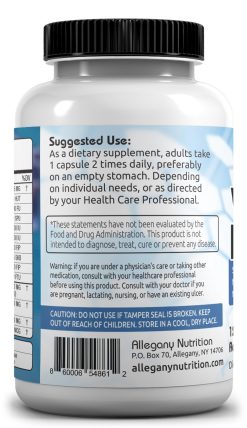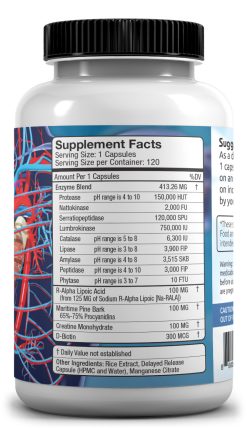Vital Health
9 Powerful Enzymes & 4 Essential Nutrients
Vital Health Features:
- Delayed Release Capsules (Vegetable)
- Survives Stomach Acid & Bile
- Contains No Soy, GMO, Shellfish, Dairy or Tree Nuts
- Made in USA
- Not a Proprietary Blend
- Wheat & Gluten Free
- Plant-Derived
- GMP Certified
- Mfg. in an Organically Certified Facility
Purchases on Allegany Nutrition are sold exclusively to Health Practitioners and Health Food Stores. Please login or register to purchase our products.
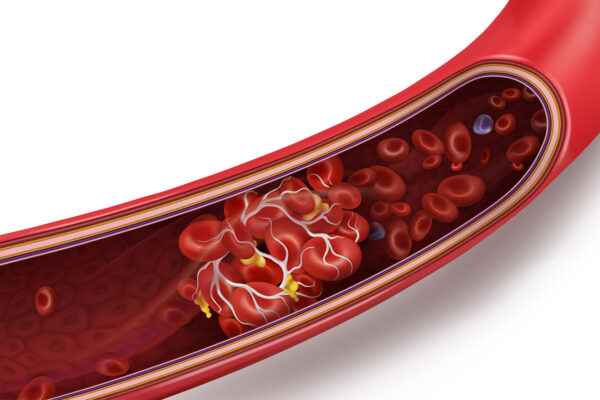 Overview
Overview
Vital Health is an all-natural formula containing 9 powerful enzymes and 4 essential nutrients to support cardiovascular health and vitality. It is also designed for overall health with its antioxidant, anti-inflammatory, and blood viscosity characteristics.
The formula works synergistically to help the body combat underlying imbalances in the body.
The cardiovascular system influences more than just the heart and blood vessels. It supports every tissue, organ, muscle and function throughout the body. When the body has an imbalance it will send blood filled with everything from oxygen, nutrients, hormones, metabolic waste, and more to and from that area. This makes the cardiovascular system one of the most crucial components of health. Everything depends on its ability to assist every part of the body with the vital nutrients it contains.
When thinking about the cardiovascular system many of us automatically think of cholesterol, blood pressure, LDL/HDL, and more. Often over looked is the role inflammation and blood viscosity have on our health.
When many people think of inflammation they usually think of acute inflammation such as a swollen finger or toe. Acute inflammation is part of the normal healing process. Chronic inflammation is negative prolonged inflammation that can be anywhere in the body and sometimes unnoticeable.
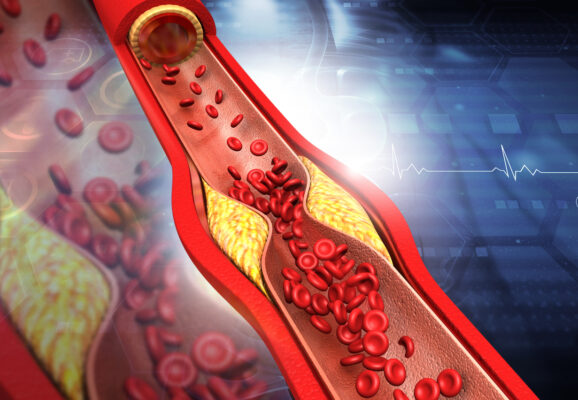
Chronic inflammation is often a contributor of heart disease, arthritis, diabetes, cancer and irritable bowel syndrome and many more.
Blood viscosity is a measurement of the thickness and stickiness of an individual’s blood. It is a direct measure of the ability of blood to flow through the blood vessels.
Blood Viscosity determines how much friction the blood causes against the vessels, how hard the heart has to work to pump the blood through the body, and how much oxygen is delivered to organs and tissues.
Blood viscosity is correlated with all known risk factors for cardiovascular disease. Elevated blood viscosity is a strong independent predictor of cardiovascular events.
To sum up, if the cardiovascular system has imbalances there can be issues throughout the body. These issues may seem unrelated to the cardiovascular system but are connected due to the importance of having a healthy cardiovascular system.
Serratiopeptidase is a proteolytic enzyme (breaks down protein) that has been used for reducing inflammation and pain. It is also believed to be beneficial in treating atherosclerosis, blood viscosity, and reducing lung inflammation in people with chronic respiratory diseases.
Many researchers believe it helps dissolve hard particles made of protein that cause unwanted side effects from toxins, scar tissue, blood clots and cyst. They feel this is achieved by facilitating immune cell movement and regulating levels of lymphocytes at the site of inflammation.
Lumbrokinase is a fibrinolytic enzyme that is used to support the cardiovascular system.
Fibrinolytic enzymes such as lumbrokinase break down fibrin. This is important because excess fibrin has been linked to hardening of the arteries (atherosclerosis) which is caused by a buildup of plaque on the inner lining of the arteries. Plaque is made up of deposits of cholesterol, fatty substances, cellular waste products, calcium, and fibrin. As it builds up in the arteries, the artery walls become thickened and stiff. Research has also shown that lumbrokinase may help inflammation related conditions, and decreasing blood viscosity by reducing fibrinolysis and breaking down blood clots.
Nattokinase has shown to have a high fibrinolytic activity (breaks down fibrin) and enhances the body’s natural ability to dissolve blood clots caused by fibrinogen and fibrin that bind platelets and red blood cells together. It has also been used to lower blood pressure by inhibiting angiotensin-converting enzyme (ACE), which constricts blood vessels and raises blood pressure. Proper blood flow and circulation are vital to good health. Nattokinase has also been shown to help improve cholesterol imbalances in the blood.
R-Alpha Lipoic Acid is an antioxidant that is made by the body, and is found in every cell of the body, where it is used to turn nutrients into energy within the mitochondria. Mitochondria are the “power houses” of our bodies.
Alpha lipoic Acid also plays an important role in helping regenerate other antioxidants such as Coenzyme Q10, Glutathione, and both Vitamin C & E.
R-Alpha Lipoic Acid has been used to reduce oxidative damage to fats in the body, and for high levels of cholesterol and other fats in the blood, which in turn can help to protect the liver and heart. Several studies suggest alpha-lipoic acid helps lower blood sugar levels and improve insulin sensitivity.

Maritime Pine Bark is an antioxidant that is believed to improve blood flow, stimulate the immune system, and reduce inflammation. It has been used for high cholesterol, heart imbalances, asthma, memory decline, diabetes, erectile dysfunction, and many more. It may also help protect mitochondria from oxidative damage, which can help cells produce energy more efficiently. This may lead to reduced fatigue and improved stamina.
Creatine Monohydrate is considered a mitochondrial nutrient because it can help increase energy production and improve mitochondrial function. It is involved in making energy for muscles to help them contract. About 95% of it is found in skeletal muscle. It is often used to improve exercise performance and muscle mass, but has also been used for muscle cramps, fatigue, multiple sclerosis (MS), depression, brain function, blood sugar, and other conditions.
D-Biotin is used to metabolize carbohydrates, fats, and amino acids which are the building blocks of protein. It is crucial for energy production in the mitochondria, and it supports many parts of your body, including your nervous system, liver, eyes, hair, and skin.
Studies show that biotin supplements may help manage symptoms of diabetes, and may also help reduce blood sugar levels, total cholesterol, and blood fats in some people with diabetes.
Catalase is an antioxidant enzyme that can catalyze the conversion of hydrogen peroxide into water and oxygen. Hydrogen peroxide is a by-product of cellular metabolism. Catalase enzymes have been used to protect our cells by counteracting and balancing the continual production of hydrogen peroxide. In addition to acting as a super antioxidant, catalase also has the ability to use hydrogen peroxide to oxidize toxins including methanol, ethanol, formic acid, formaldehyde, and nitrite. This type of dual activity makes it a crucial cellular enzyme and antioxidant.
Protease & Peptidase are proteolytic enzymes that break down proteins, and cellular waste in the blood stream and throughout the body. These enzymes may help the body’s immune system break down toxins, foreign proteins, pathogens, and dead cells. This may help reduce stress off of other body systems.
Lipase is a lipolytic enzyme that breaks down fat. Poor fat and lipid metabolism may lead to cardiovascular imbalances because fats are a major source of fuel for the heart and brain. Lipase may help control triglyceride and LDL cholesterol imbalances.
Amylase is an enzyme that breaks down carbohydrates, starches, and sugars.
Phytase is an enzyme that breaks down phytate which negatively binds important minerals.
Serving Size & Supplemental Facts
Vital Health
CAPSULES PER BOTTLE: 120 Delayed Release Capsules.
SUGGESTED SERVING SIZE: 1 Capsule
Directions: As a dietary supplement, adults take 1 capsule two times daily, preferably on an empty stomach or as recommended by your Health Care Professional.
Contains no fruit, egg, dairy, soy, lactose, meat, fish, shellfish, wheat, gluten, tree nuts, or artificial ingredients.
| Ingredients | Amt/1 capsule (Ingredients Per Capsule) | Function of Each Enzyme |
|---|---|---|
| Serratiopeptidase | 120,000 SPU | Breaks down fibrin. |
| Lumbrokinase | 750,000 IU | Breaks down fibrin. |
| Nattokinase | 2,000 FU | Breaks down fibrin. |
| Protease pH range is 4 to 10 | 150,000 HUT | Breaks down proteins. |
| Catalase pH range is 5 to 8 | 10,000 IU | Converts hydrogen peroxide into water and oxygen. |
| Lipase pH range is 3 to 8 | 3,900 FIP | Breaks down fats and oils. (triglycerides and lipids) |
| Peptidase pH range is 4 to 10 | 3,000 HUT | Breaks down proteins. |
| Amylase pH range is 4 to 10 | 3,515 SKB | Breaks down carbohydrates and starches. |
| Phytase pH range is 3 to 7 | 10 FTU | Breaks down phytate which negatively binds important minerals. |
| R-Alpha Lipoic Acid (from 125mg of Sodium R-Alpha Lipoic [Na-RALA]) | 100 MG | Natural Antioxidant found in every cell. |
| Maritime Pine Bark 65%-75% Procyanidins | 100 MG | Antioxidant |
| Creatine Monohydrate | 50 MG | Mitochondrial Nutrient |
| D-Biotin | 300 MCG | Used for energy production in mitochondria. |
| Other Ingredients: Rice Extract, Delayed Release Capsule (HPMC, Water), Manganese Citrate |
Compare Vital, Cardio, Natto
| Enzymes Listed Below (Activity Per Capsule) | Natto-LP | Cardio Support | Vital Health |
|---|---|---|---|
| Nattokinase | 2,000 FU | 0 | 2,000 FU |
| Lumbrokinase | 0 | 750,000 IU | 750,000 IU |
| Serratiopeptidase | 0 | 120,000 SPU | 120,000 SPU |
| Catalase | 0 | 3,000 U | 10,000 U |
| Protease | 180,000 HUT | 200,000 HUT | 150,000 HUT |
| Peptidase | 3,500 HUT | 1,000 HUT | 3,000 HUT |
| Lipase | 12,000 FIP | 1,000 FIP | 3,900 FIP |
| Amylase | 6,000 SKB | 0 | 3,515 SKB |
| GlucoAmylase | 40 AGU | 0 | 0 |
| Cellulase | 1,000 CU | 0 | 0 |
| Phytase | 0 | 0 | 10 FTU |
| Trace Minerals | 40 MG | 0 | 0 |
| Ashwagandha Extract KSM-66 (5% Withanolides) (<0.1 Withaferin A) | 0 | 165 MG | 0 |
| Boswellia Extract (65% Boswellic Acids) | 0 | 58 MG | 0 |
| Pine Bark Extract (95% Proanthocyanidins) | 0 | 55 MG | 0 |
| Turmeric Extract (95% Curcuminoids) | 0 | 49 MG | 0 |
| Gingko Biloba Extract 24% / 6% | 0 | 44 MG | 0 |
| Resveratrol (98% Polygonum Cuspidatum) | 0 | 40 MG | 0 |
| Black Pepper Extract (95% Piperine) | 0 | 2 MG | 0 |
| R-Alpha Lipoic Acid (from 125mg of Sodium R-Alpha Lipoic [Na-RALA]) | 0 | 0 | 100 MG |
| Maritime Pine Bark (65%-75% Procyanidins) | 0 | 0 | 100 MG |
| Creatine Monohydrate | 0 | 0 | 50 MG |
| D-Biotin | 0 | 0 | 300 MCG |


